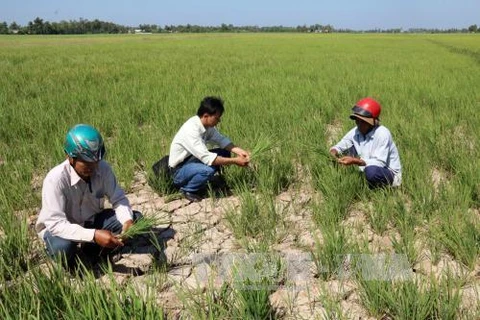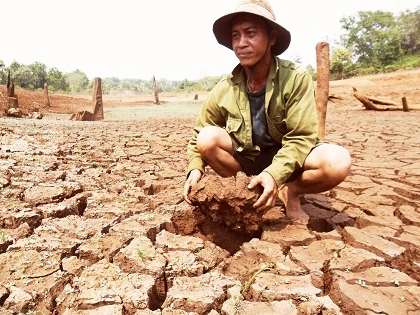 Experts at the conference reject study results that claimed the 11 hydropower dams in the Mekong River had little impact on Vietnam and millions of people downstream. (Photo: VNA)
Experts at the conference reject study results that claimed the 11 hydropower dams in the Mekong River had little impact on Vietnam and millions of people downstream. (Photo: VNA) Can Tho (VNA) - Aside from natural forces like climate change, countries’ actions have worsened the drought and salinity in Vietnam’s Mekong Delta.
Six hydropower dams built in China’s territory stop a large amount of water from entering the Mekong River during the dry season, Duong Van Ni of the Faculty of Environment and Natural Resources at Can Tho University said during a conference on hydropower dams held recently in Can Tho.
This water is used to generate electricity and run irrigation systems in the Mekong Delta. But it stops the flow of water to Vietnam, which has contributed to the serious drought southern Vietnam is facing. It could last until 2017.
The Manwan and Nuozhadu hydropower dams began stopping the water flow in 2012. The two dams hold in billions of cubic metres of water, meaning the volume of water upstream is exceptionally high.
If countries along the Mekong River regulated the water in their dams more effectively, the Mekong Delta in southern Vietnam would not be facing such serious drought and saline intrusion. Ni said the dams caused a sharp fall in silt, which in turn reduced rice output in the delta by around 500,000 tonnes per year.
However, a solution won’t be found any time soon, as China has developed a 62 billion USD project to draw in more water from the mainstream Mekong River to Beijing.
Ky Quang Vinh, Director of the Climate Change Office in Can Tho city’s People’s Committee, said China had commandeered water sources from countries located downstream. Thus China had to spend much less money treating the land for saline intrusion than others.
Thailand has also begun a huge water transportation project to take water from the Mekong River to irrigate its land and prevent drought, affecting countries downstream like Vietnam. It will operate three water pumps with a capacity of 36,000 cu.m per second. The country also built a dyke to take water from the river to its Northeastern region.
With water shortages in the Mekong River and climate change, the rate of salinity has increased sharply. According to the Climate Change Office, the salinity rate has increased greatly in Can Tho. Ground depression and rising sea levels have also contributed. While sea levels rise 4mm per year, the ground depresses 1 to 2cm annually. This is a result of excessive ground water exploitation.
Study results
Experts at the conference rejected study results that claimed the 11 hydropower dams in the Mekong River had little impact on Vietnam and millions of people downstream.
The Mekong Delta Study project was funded by the Ministry of Natural Resources and Environment and managed by the Vietnam National Mekong Committee with advice from the Danish Hydraulic Institute (DHI).
According to Duong Van Ni of Can Tho University, the Danish data was inconsistent. The Danish data found that the Chinese dams hadn’t had much impact, while local scientists had found a large range of negative impacts in their own research.
Regarding biodiversity, the Danish study only mentioned a few species or nutrient sources affected by dam construction.
Experts at the conference said the results of the study were unreliable and did not take into account the full impact of hydropower dams on the main Mekong River and the Mekong Delta.
The study showed that the 11 dams in the Mekong River mainstream collect water over 16 hours and discharge water eight hours a day. Vietnamese experts said this could not be true, considering the large, devastating impacts from the dams.
Dr. Nguyen Huu Thien, an expert in ecology, told the conference that the study had simplified research issues and underestimated the impact of the dams on the Mekong Delta. He said the study only assesses the impact of damming on white-skinned fish and ignores that on black-skinned fish. The Danish experts chose to evaluate only low-value fish, ignoring those of high value, Thien said.-VNA
























